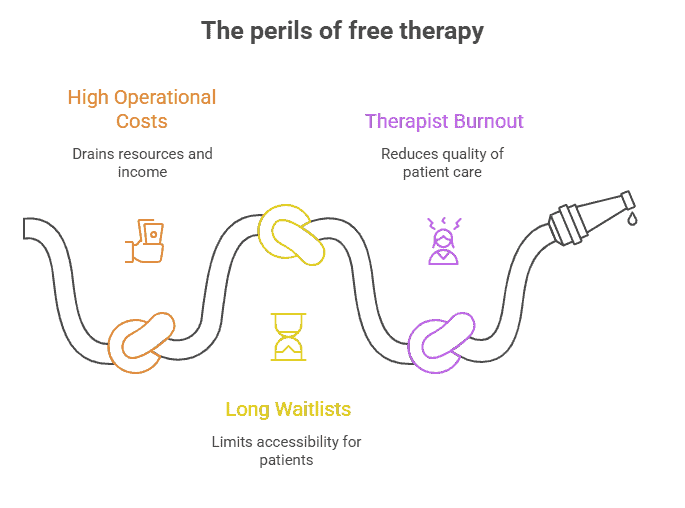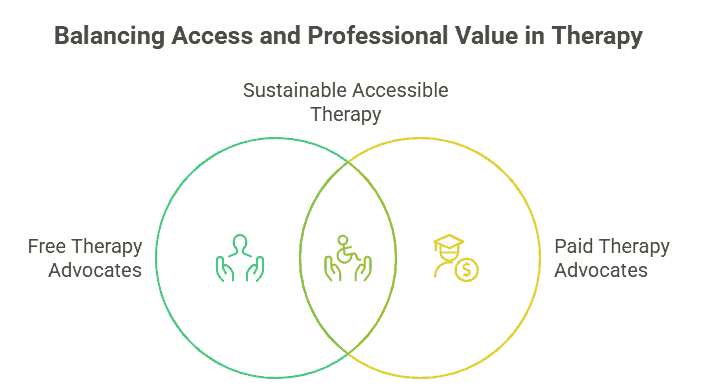Should therapy be free or not? Strong arguments can be made on either side of this question. Advocates for free therapy highlight that money should never be an issue in seeking help and talk therapy should be set apart from stigma so that one’s mental health can be considered a human right. Critics, on the other hand, worry about how the system could be sustained, proper payments for therapists, and the devaluation of the expertise of these professionals.
In my mind, a reasonable solution exists somewhere in the middle, with the ability to still afford subsidized, low-cost services or go one step further and offer free crisis services that allow a more equitable provision of mental health support and quality care.

The Big Question
You’ve finally decided to consult someone about your stress, yet you have to think about whether your bank account will survive weekly sessions. For many people, that is their reality, and this is why therapy is such a hot topic. Some maintain that therapy should be a basic human right, forthwith, as public education is. Others insist it is a skilled trade that is deserving of some kind of pay. The truth, as with many debates, is no less than halfway down the middle.
The Case for Free Therapy
Accessibility for All
The matter of argument for free therapy is straightforward: access. Mental health issues don’t arrive with your income sweepstakes at hand. Depression, anxiety, or grief may afflict any person, and often therapy ends up being the greatest barrier to figuring out one’s life. Free services mean nobody is refused help due to an incapacity to pay.
Reducing Stigma
When services are free, more people are likely to try them. Just as public libraries normalize reading and community gyms encourage exercise, accessible therapy could normalize mental health care. Free therapy might shift the cultural perception of counseling from being a “luxury” to being just as essential as a doctor’s visit.
A Social Justice Perspective
In some cases, this debate stems from an issue of fairness. If society believes mental health is equal to physical health, why would treatment not be equally available for all? Those in support for free therapy think that income-based care increases existing inequities. Untreated mental health issues tend to cause ripple-like effects in families, workplaces, and communities.
Broader Societal Benefits
Investment in mental health yields returns beyond an office visit to therapy. Early intervention, if effective, reduces emergency room burdens, alongside those of the justice system and social services. In other words, money spent today on therapy could save a far larger sum later. (That would be the preventative maintenance: similar to oil-changing, but in the case of the brain.)
The Challenges of Free Therapy
Therapist Compensation
Therapists don’t just hand out advice over coffee. They complete years of schooling, training, and licensing, often with hefty student loans. Asking them to provide therapy for free without another system of support is like asking a dentist to fill cavities out of goodwill—it’s generous, but not sustainable.
Risk of Devaluing the Profession
Free therapy risks sending a message that counseling is not a skilled service. But therapy is a specialized service: It involves evidence-based methods, ethics, and ongoing training. When people get something for free, they, by inattention, may feel less of its value to the apprehension of the undercutting of roles of both the therapist and the commitment of the client.
Sustainability Concerns
Running therapy practices involves rent, utilities, insurance, and administrative support. Without income, the infrastructure collapses. Free therapy may sound noble, but without proper funding, it risks creating waitlists, burnout, and reduced quality of care.
Potential for Reduced Engagement
When clients do not invest anything, sometimes they feel less accountable to show up or engage; this of course does not apply to everyone, but it’s a dynamic many therapists will notice. The exchange of money, even if it’s just a little, can sometimes give rise to that sense of shared responsibility.
Middle Ground Solutions

Sliding Scale Models
One popular compromise is income-based pricing. Sliding-scale fees let clients pay what they can afford, ensuring fairness without forcing therapists to work unpaid.
Government and Non-Profit Support
Several countries and states already support mental health programs with their funds. Hotlines, crisis centres, or public clinics all fix their prices on the basis of an income, generally free of charge in cases of an emergency. Government-aided programs such as the 988 Suicide & Crisis Lifeline in the United States represent instruments for taking intervention-willing individuals into support.
Campus and Workplace Programs
Universities and workplaces often include counseling as part of student services or employee assistance programs. These models provide short-term, free therapy sessions funded by institutions rather than individuals.
Volunteer and Crisis-Based Services
Non-profit and community organizations sometimes use trained volunteer crisis support. While this is not therapy, it is critically important to those in tunnels of crisis and immediate need.
What We Can Learn from Global and Local Models
Looking at the bigger picture, different regions approach this issue in unique ways. Some countries with publicly funded healthcare integrate mental health services, while others rely on community-based organizations. The U.S. model is more patchwork—mixing private practices with government initiatives. The lesson? A mix of options—government support, affordable private therapy, and community resources—seems to create the most balanced system.
What This Means for Everyday People
Now, what about an individual who just needs to find help? Will we ever wonder again, Should Therapy Be Free? The thought is rejected way too soon because, whatever the decision, therapy need not be free to be accessible. Sliding scales, insurance reimbursement, and community programs… they provide options to be cared for without draining your savings. Prices do matter, but putting money into your mental health is one investment that will never be wasted.
Next Steps: Making Therapy Accessible Without Making It Free
The truth is that therapy can’t always come at no charge—but it can be done fairly. Policymakers, communities, and therapists can work in conjunction to broaden the options. Insurance parity laws, telehealth bills, and subsidies can all serve to increase access without undercutting quality. Simultaneously, awareness campaigns and crisis hotlines can make sure that much more assistance is provided toward helping people take the first step for care.
Final Thoughts
The question of whether therapy should be free is not about choosing sides but about rethinking priorities. Free therapy everywhere may not be realizable, but therapy does need to be accessible for all. The way ahead would comprise of creative solutions: affordable prices, extended public programs and community-based support. After all, mental health care is no longer a luxury-it’s a necessity.
At Illinois Therapists, we understand how overwhelming balancing cost with the need to be able to seek help can be. Inner Peace Therapies presents a safe and supportive space where healing can begin on an individual level, as a couple, or for families. If you have problems involving relationships, family stresses, or personal struggles, the therapists here will show you the way to health, happiness, and peace in accordance with your needs and your resources.





